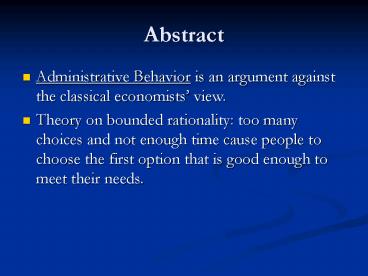Abstract - PowerPoint PPT Presentation
1 / 17
Title: Abstract
1
Abstract
- Administrative Behavior is an argument against
the classical economists view. - Theory on bounded rationality too many choices
and not enough time cause people to choose the
first option that is good enough to meet their
needs.
2
Background
- Herbert Simon researcher in the fields of
cognitive psychology, computer science,
economics, and philosophy. Economic theory of
"bounded rationality 1978 Nobel in economics. - Born Milwaukee, Wisconsin in 1916. BA, PH.D.
from University of Chicago. Served on the faculty
of Carnegie Mellon University. - Pioneer in the field of artificial intelligence.
- Administrative Behavior.
- The Logic of Causal Relations.
- A Comparison of Game Theory and Learning Theory.
3
Rationalism
- Objective rationality implies three main elements
in decision-making process. - Knowledge Anticipation
- Foresight of Value of Outcome
- Make Choice Among all Possible Alternatives
4
Rationalism Knowledge Anticipation
- First, people look at all the different outcomes
and choose those that are considered to be the
best means for reaching the desired ends. - Construction of a means-ends chain is part of the
theory of rationality.
5
Rationalism Foresight of Value of Outcome
- People consider all consequences that follow each
choice. - In group behavior, one must know what actions the
others in the group will make. - Example military strategy.
6
Rationalism Choice Among All Possible
Alternatives
- Rank each alternative in the order of preference
and choose the best one. - Example A federal loan agency may decide to
lower administration costs. Valuation
7
Limits on Rationalism
- Limits on rationality Human organizational
behavior are intendedly rational, but only
boundedly so (Simon, p. 88). - Difficulty of complete knowledge and anticipation
of consequences. - Difficulty of knowledge of value of outcome.
- Difficulty of all possible alternatives.
8
Limits on Rationalism
- The human being has only part of the full
conditions and laws surrounding his actions. - Example fire department needs to know all
probabilities of fire in order to be completely
efficient.
9
Limits on Rationalism
- One cannot know the full value of something from
imagination. - We trust experts to find the facts and
calculate their implications for us. But experts
have their own subjective values.
10
Limits on Rationalism
- In actual behavior, we can only think of a
limited number of all possible alternatives.
11
Empirical Evidence for Bounded Rationality
- Simon lists several empirical evidences for
bounded rationality. - Most people choose action that is good enough.
- The average person examines the world through a
much simplified model of the real world. - Most people choose their actions without first
examining all possible behavior alternatives. - Organizations inducements incentives.
12
Empirical Evidence for Bounded Rationality
- The average person in reality chooses a course of
action that is good enough to satisfy his needs.
- Examples share of market, reasonable profit, and
fair price.
13
Empirical Evidence for Bounded Rationality
- The average person examines the world through a
much simplified model of the real world. - Example public administrators deal with one or
a few problems at a time, because the limits on
attention simply dont permit everything to be
attended to at once (Simon, p. 119).
14
Empirical Evidence for Bounded Rationality
- Most people choose their actions without first
examining all possible behavior alternatives. - Common sense confirms most of us use bounded
rationality in our decision-making process. - Second test is information processing psychology.
- Example of information processing psychology is
that each person within an organization has his
own value and agenda that may be different from
the whole group.
15
Empirical Evidence of Bounded Rationality
- Organizations use inducements and provide
incentives to mold human behavior. - Example stock options, salary, status and
prestige of the job.
16
Assessment
- Theory of bounded rationality complements the
idea of pluralism and group theory. - There is no way an individual can become an
expert in all the complex issues that his group
tackles. He gives consent for the group to think
for him and uses bounded rationality to make
decisions based on the information that the group
provides for him.
17
Assessment
- I believe that many of Simons theory of bounded
rationality apply to individual and group
behavior in all areas of the public as well as
the private sector.































